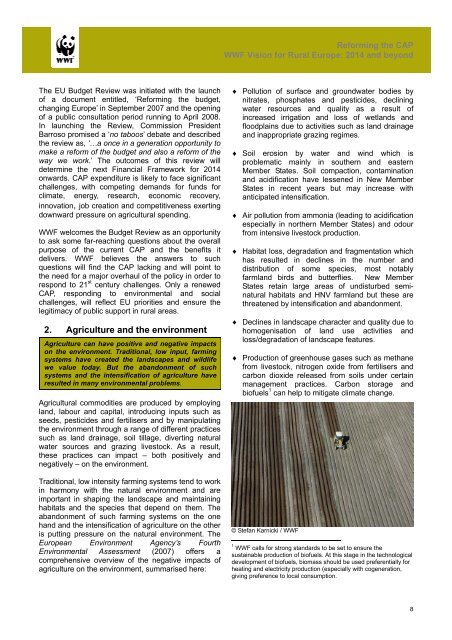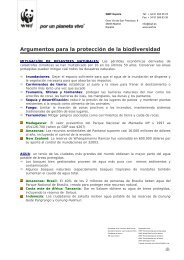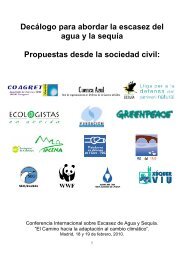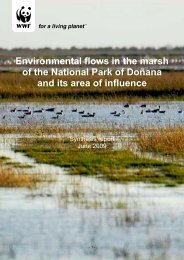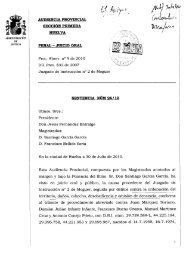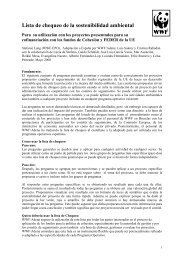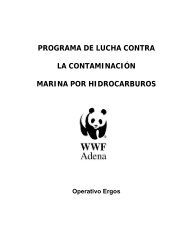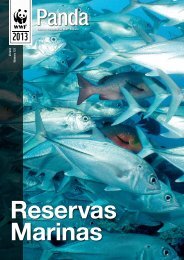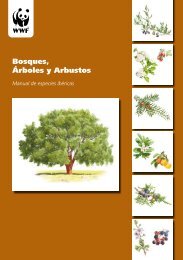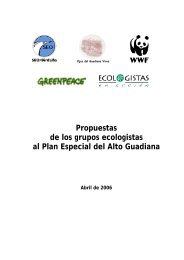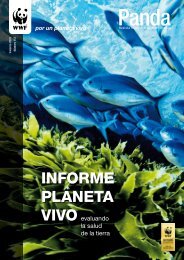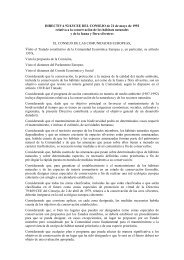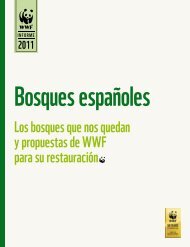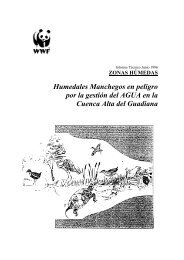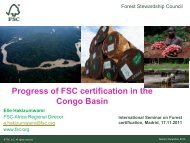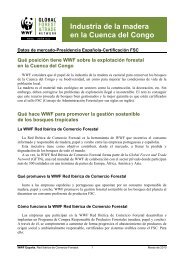Reforming the CAP WWF Vision for Rural Europe after 2013
Reforming the CAP WWF Vision for Rural Europe after 2013
Reforming the CAP WWF Vision for Rural Europe after 2013
You also want an ePaper? Increase the reach of your titles
YUMPU automatically turns print PDFs into web optimized ePapers that Google loves.
<strong>Re<strong>for</strong>ming</strong> <strong>the</strong> <strong>CAP</strong><br />
<strong>Re<strong>for</strong>ming</strong> <strong>the</strong> <strong>CAP</strong><br />
<strong>WWF</strong> <strong>Vision</strong> <strong>for</strong> <strong>Rural</strong> <strong>Europe</strong>: 2014 and beyond<br />
<strong>WWF</strong> <strong>Vision</strong> <strong>for</strong> <strong>Rural</strong> <strong>Europe</strong> <strong>after</strong> <strong>2013</strong><br />
The EU Budget Review was initiated with <strong>the</strong> launch<br />
of a document entitled, ‘<strong>Re<strong>for</strong>ming</strong> <strong>the</strong> budget,<br />
changing <strong>Europe</strong>’ in September 2007 and <strong>the</strong> opening<br />
of a public consultation period running to April 2008.<br />
In launching <strong>the</strong> Review, Commission President<br />
Barroso promised a ‘no taboos’ debate and described<br />
<strong>the</strong> review as, ‘…a once in a generation opportunity to<br />
make a re<strong>for</strong>m of <strong>the</strong> budget and also a re<strong>for</strong>m of <strong>the</strong><br />
way we work.’ The outcomes of this review will<br />
determine <strong>the</strong> next Financial Framework <strong>for</strong> 2014<br />
onwards. <strong>CAP</strong> expenditure is likely to face significant<br />
challenges, with competing demands <strong>for</strong> funds <strong>for</strong><br />
climate, energy, research, economic recovery,<br />
innovation, job creation and competitiveness exerting<br />
downward pressure on agricultural spending.<br />
<strong>WWF</strong> welcomes <strong>the</strong> Budget Review as an opportunity<br />
to ask some far-reaching questions about <strong>the</strong> overall<br />
purpose of <strong>the</strong> current <strong>CAP</strong> and <strong>the</strong> benefits it<br />
delivers. <strong>WWF</strong> believes <strong>the</strong> answers to such<br />
questions will find <strong>the</strong> <strong>CAP</strong> lacking and will point to<br />
<strong>the</strong> need <strong>for</strong> a major overhaul of <strong>the</strong> policy in order to<br />
respond to 21 st century challenges. Only a renewed<br />
<strong>CAP</strong>, responding to environmental and social<br />
challenges, will reflect EU priorities and ensure <strong>the</strong><br />
legitimacy of public support in rural areas.<br />
2. Agriculture and <strong>the</strong> environment<br />
Agriculture can have positive and negative impacts<br />
on <strong>the</strong> environment. Traditional, low input, farming<br />
systems have created <strong>the</strong> landscapes and wildlife<br />
we value today. But <strong>the</strong> abandonment of such<br />
systems and <strong>the</strong> intensification of agriculture have<br />
resulted in many environmental problems.<br />
Agricultural commodities are produced by employing<br />
land, labour and capital, introducing inputs such as<br />
seeds, pesticides and fertilisers and by manipulating<br />
<strong>the</strong> environment through a range of different practices<br />
such as land drainage, soil tillage, diverting natural<br />
water sources and grazing livestock. As a result,<br />
<strong>the</strong>se practices can impact – both positively and<br />
negatively – on <strong>the</strong> environment.<br />
Traditional, low intensity farming systems tend to work<br />
in harmony with <strong>the</strong> natural environment and are<br />
important in shaping <strong>the</strong> landscape and maintaining<br />
habitats and <strong>the</strong> species that depend on <strong>the</strong>m. The<br />
abandonment of such farming systems on <strong>the</strong> one<br />
hand and <strong>the</strong> intensification of agriculture on <strong>the</strong> o<strong>the</strong>r<br />
is putting pressure on <strong>the</strong> natural environment. The<br />
<strong>Europe</strong>an Environment Agency’s Fourth<br />
Environmental Assessment (2007) offers a<br />
comprehensive overview of <strong>the</strong> negative impacts of<br />
agriculture on <strong>the</strong> environment, summarised here:<br />
♦ Pollution of surface and groundwater bodies by<br />
nitrates, phosphates and pesticides, declining<br />
water resources and quality as a result of<br />
increased irrigation and loss of wetlands and<br />
floodplains due to activities such as land drainage<br />
and inappropriate grazing regimes.<br />
♦ Soil erosion by water and wind which is<br />
problematic mainly in sou<strong>the</strong>rn and eastern<br />
Member States. Soil compaction, contamination<br />
and acidification have lessened in New Member<br />
States in recent years but may increase with<br />
anticipated intensification.<br />
♦ Air pollution from ammonia (leading to acidification<br />
especially in nor<strong>the</strong>rn Member States) and odour<br />
from intensive livestock production.<br />
♦ Habitat loss, degradation and fragmentation which<br />
has resulted in declines in <strong>the</strong> number and<br />
distribution of some species, most notably<br />
farmland birds and butterflies. New Member<br />
States retain large areas of undisturbed seminatural<br />
habitats and HNV farmland but <strong>the</strong>se are<br />
threatened by intensification and abandonment.<br />
♦ Declines in landscape character and quality due to<br />
homogenisation of land use activities and<br />
loss/degradation of landscape features.<br />
♦ Production of greenhouse gases such as methane<br />
from livestock, nitrogen oxide from fertilisers and<br />
carbon dioxide released from soils under certain<br />
management practices. Carbon storage and<br />
biofuels 1 can help to mitigate climate change.<br />
© Stefan Karnicki / <strong>WWF</strong><br />
1<br />
<strong>WWF</strong> calls <strong>for</strong> strong standards to be set to ensure <strong>the</strong><br />
sustainable production of biofuels. At this stage in <strong>the</strong> technological<br />
development of biofuels, biomass should be used preferentially <strong>for</strong><br />
heating and electricity production (especially with cogeneration,<br />
giving preference to local consumption.<br />
8


